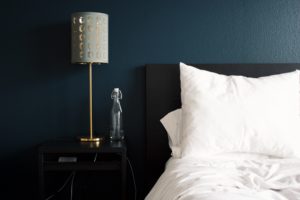“We are what we repeatedly do. Excellence, therefore, is not an Act, but a Habit.”
You may have a negative association with the word “routine” because it sounds repetitive, boring, and dull. I’m not here to argue that point with you… I like variety as much as the next person, and I can’t imagine living the same Groundhog Day-esque life over and over again. What I am going to argue is that the discipline of routine actually creates the freedom to do whatever the heck else you want.
For instance, let’s say you’ve tried and failed to lose the same five to ten pounds year after year. You keep trying the whole “diet and exercise” thing, but you can’t get it to stick. That’s because you’re trying to add a restrictive diet and time-consuming training plan on top of your already busy life – a life that is full of ingrained habits you’ve established over decades. You can’t just will “eating healthy” and “training everyday” into your life. You have to mesh these new habits into your current routine.
 Only when eating healthy and moving your body become part of your daily routine will those habits stick.
Only when eating healthy and moving your body become part of your daily routine will those habits stick.
But how do you make “healthy” happen?
You establish a routine.
I use the word “routine” to describe something being on autopilot. When something is routine, it’s automatic. You don’t have to think about it, you just do it automatically, like putting on your seatbelt when you get into a car (I hope).
Once eating healthy and exercising become just another part of your routine, you free up so much mental energy for other things in your day, like getting shit done at the office, planning your next adventure around the world, or enjoying downtime with friends and family.
You already have a routine of what you do in the morning and the evening. All you have to do is make that routine work for you, rather than against you. I wrote about this subject last year when I successfully established a routine of making my bed each morning and exponentially increased my productivity as a result.
I’d like to take you one step further today and share with you the morning and evening routines that help me make healthy choices on autopilot.
Note: You do not need to copy this routine point for point. I hope to merely offer you ideas for how to improve your morning and evening routine so that you can live a happier, healthier, and more productive life.
My Morning Routine

It’s well-established that going to sleep and waking at the same time each day helps your body in a myriad of ways – not least of which is regulating your hormones and energy levels. This means it’s easier to wake up in the morning, feel energized and motivated throughout the day, think clearly and effectively, and fall asleep soundly so you can do it all again the next day.
Set a recurring alarm on your phone (or better yet, with an actual alarm clock so you can turn your phone off overnight). Figure out how much time you need to prepare for your day, and set the alarm so that you have that much time for yourself.
The best way to ensure you actually stick to a new routine is to make a checklist of what must get done in the morning for you to feel ready to tackle the day. Following a list might strike you as strange or constricting, but again, the idea is to guide you along until your morning routine is on autopilot. (Incidentally, pilots and surgeons use checklists to make sure they don’t crash planes or kill people during and after surgery, so if you think of yourself as a pilot checking things off your pre-flight list, the process can seem more fun.)
My morning checklist includes:
- Making my bed;
- Drinking 16-20 oz of water to rehydrate;
- Taking a powdered greens supplement (in lieu of a multivitamin);
- Putting on the kettle to make
rocket fuelcoffee; - Physically writing three things I’m grateful for and one “Most Important Task” for the day.
Don’t do anything else until your checklist is complete – especially do not check email or social media because these things will distract you from taking care of the important tasks on your checklist. Once you’ve checked off each task on your list, your day can start.
In my own experience, this makes for a much more organized day. After running through my morning checklist, my head is clear, I know what I need to accomplish, and I have a rough idea of when I need to be doing what. I use a journal/day-planner to keep track of hourly appointments, which further helps me to plan my day. You can use your phone or email calendar to do the same, but I find physically writing these things down and having room for extra notes helpful.
At first, I had to physically write down this checklist and keep it on my bedside table so that I could follow it point by point. Now, it’s automatic. I just wake up and do these things without needing to reference any list. Then, I can tackle my day feeling in control because I’ve ticked off all the “right” boxes.
My Evening Routine

It’s hard to say which is more important, having a morning or evening routine. But I’d argue for the latter because it sets you up for success the next day. By doing certain things each night, I can unwind and head to bed for a restful sleep, knowing I’ve done everything I wanted to do and feeling prepared to do the same the next day.
Sleep is an insanely important “reset” button. Study after study shows that our sleep quality has a huge effect on our ability to function in every aspect, from maintaining a healthy weight or performing in the gym, to thinking clearly and staying healthy.
You can Google “evening routines” to your heart’s content, and you’ll find some constants among your search results: turn off electronics 30-90 minutes before bed, read or journal, meditate, keep your bedroom cool and dark, etc.
I do many of these things and find that I sleep much better as a result.
The keys for me have been:
- Turning my phone on do-not-disturb;
- Looking over my schedule for the next day;
- Doing a brain dump of all the things racing through my mind;
- Packing my gym bag and work materials for the next day;
- Reading a book or coloring (it’s soothing);
- Playing with my puppy (mostly soothing when he’s not a spaz);
- Drinking tea or Natural Calm (a calcium/magnesium supplement that aids relaxation).
The main idea is to block off an hour or so of time for your brain to downshift from “fight or flight” mode to a “rest and digest” state more conducive to restful sleep. If you’ve ever tossed and turned all night because your mind is racing, you are familiar with the former and could use some of the techniques above to shift into the latter state.
Consider Your Weekly Routine
In addition to the things I do every morning and evening, I have a mental list of things that need to happen on a weekly basis: grocery shopping, meal prep, making follow up calls to coaching clients and prospects, etc. I plan these into my week by putting them on my calendar.
If this sounds anal, sue me. I’m a little Type-A and somewhat OCD. If you like flying by the seat of your pants, that’s fine. (How’s that working for you, though?) Having a list of the things you need to do ensures these things actually get done.
Once you know all the repeat tasks you have to get done each week, you can set aside time to take care of those things. I find it helpful to batch similar tasks together, like getting most of my writing done in a specific block of time, writing several training programs all at once, batch cooking food for the week, etc. This means less mental gear-switching throughout the day.
Establishing Your Routine
Look, everything happens in rhythms and cycles. Day turns to night, the sun rises and sets, tides ebb and flow… and people are no different. Establishing a routine to bookend your day helps to create the freedom to do whatever you want the rest of the time. If something is important to you, tackle it first thing; then the rest of your day can be filled with video games, Netflix, or wandering aimlessly around a bookstore. Whatever.
One of the first things I work on with coaching clients is fitting diet and exercise into what they already do. Starting out, you may need a checklist to stay on track.
You can create a your own physical checklist and keep it on your bedside table. Or, if you prefer new-school digital reminders, there are a million and one apps that can help you with that (I like the free Strides app for habit tracking).
After a while, these new tasks will become part of your routine. And once you’re running on autopilot, you won’t have to think about whether you’re going to eat vegetables or exercise or whatever other healthy habits you want to develop… you’ll just do it.
Don’t waste mental energy trying to cram a new diet and exercise program into your already busy life. Make these healthy habits part of your daily routine. Distractions stand no chance to derail you once you initiate your routine.
This is exactly how people successfully accomplish goals from losing weight or building muscle to launching a new business. It doesn’t happen by chance, or when you’re feeling motivated… lasting change happens incrementally by taking the right actions backed by force of habit.

